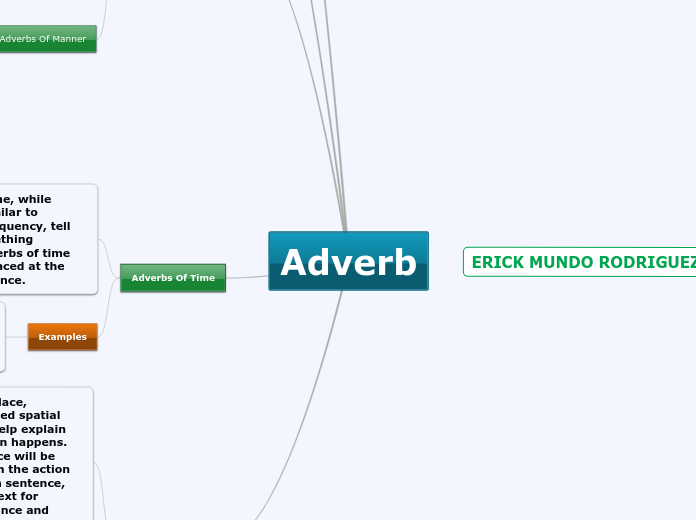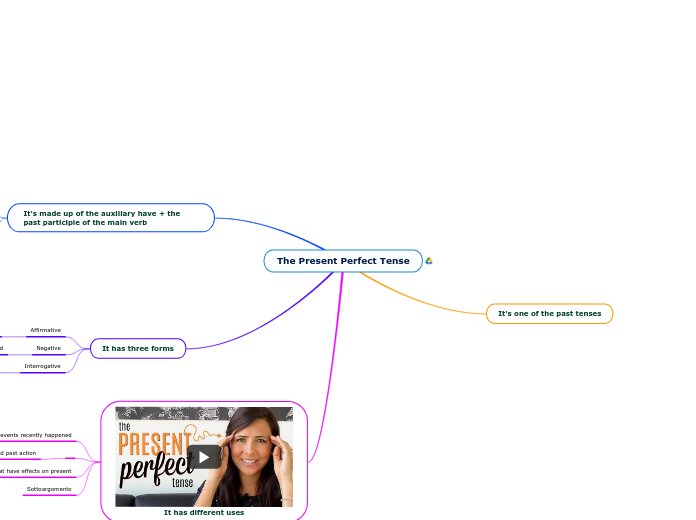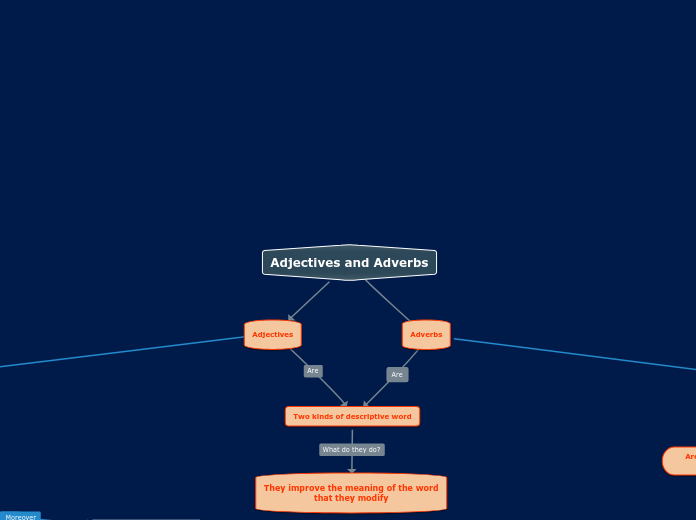חלקי דיבור
The part of speech is a category to which a word is assigned according to its syntactic functions. In English the main parts of speech are noun, pronoun, adjective, determiner, verb, adverb, preposition, conjunction, and interjection.
מילות קישור
An interjection is used to express emotion in a sentence.
Think of other interjections!
כאשר
אבל
מילות יחס
An adverb is used to describe a verb, but it can also describe an adjective or another adverb.
Adverbs normally help paint a fuller picture by describing how something happens.
אלייך
The intensifiers strengthen adverbs adjectives and adverbs and down- toners make them weaker.
down-toners
Fairly, Rather
intensifiers
Extremely, Very
אלינו
Just, Afterward, Soon, Currently
בתוך
Always, usually, Never
אל
Carefully, Slowly
תוארי פועל
A numeral is a word or phrase that describes a numerical quantity.
Some theories of grammar use the word 'numeral' to refer to cardinal numbers that act as a determiner to specify the quantity of a noun, for example the 'two' in 'two hats'.
מהר
One, two..
כאן
First, second..
פעלים
A pronoun is a word that can be used in place of a noun, typically after the noun itself has already been stated.
בוכים
Interrogative pronouns are used in questions. Although they are classified as pronouns, it is not easy to see how they replace nouns. Who, which, what, where, and how are all interrogative pronouns.
Which, Who
נכנסת
Reciprocal pronouns are used for actions or feelings that are reciprocated. The reciprocal pronouns are each other and one another.
Each other, one another
עמד
A reflexive pronoun ends with ...self or ...selves and refers to another noun or pronoun in the sentence (usually the subject of the sentence). The reflexive pronouns are myself, yourself, herself, himself, itself, ourselves, yourselves, and themselves.
Itself, Himself
ישב
Demonstrative pronouns are used to demonstrate (or indicate). This, that, these, and those are all demonstrative pronouns.
This, These
אמרה
Possessive pronouns are used to show possession. The possessive pronouns are mine, yours, his, hers, ours, and theirs.
His, Your
קטפו
The personal pronouns are I, you, he, she, it, we, they. More often than not (but certainly not always), they replace nouns representing people.
He, They
תארים
An adjective is a word that's used to describe a specific noun and to provide more detail to the listener.
רציני
Superlative adjectives demonstrate a higher level of comparison between entities.
She is the prettiest princess.
בישני
Expresses a comparison between two entities or groups of entities in quality or degree.
He is taller than she is.
שמות עצם
A noun is defined as a person, place, thing or idea. Proper nouns always begin with a capital letter. Common nouns, which are general words, such as 'cars,' are not capitalized.
סיר
Compound nouns are words where two nouns have been stuck together to make a new noun. Compound nouns should be written as one word, without a hyphen.
Candlestick
ארון
A noun which refers to a group of things/people.
Family, Class
אריה
Countable nouns are nouns that can be counted, even if the number might be extraordinarily high.
Uncountable nouns are nouns that come in a state or quantity which is impossible to count; liquids are uncountable, as are things which act
like liquids.
Cats, Rain
מכתב
Proper nouns are the names of specific people or places. They should always begin with a capital letter.
Mary, Paris
שמות תואר
A verb is an action word or 'doing' word that signifies movement in some way.
יפה
A modal is a type of auxiliary (helping) verb that is used to express: ability, possibility, permission or obligation. The main modal verbs in the English language are: can, could, may, might, must, shall, should, will, would.
I might go to the park if I get my homework done.
בישנית
A linking verb connects the subject with a word that gives information about the subject, such as a condition or relationship.
You look exhausted after studying all night.
מזהב
A verb with its own meaning: a verb that is not an auxiliary verb.
Create sentences
They have it.









